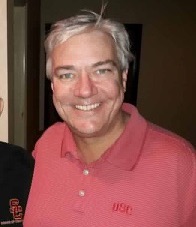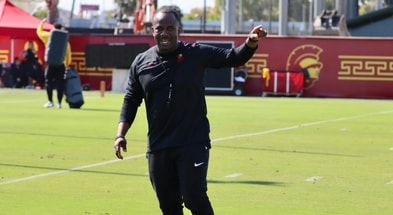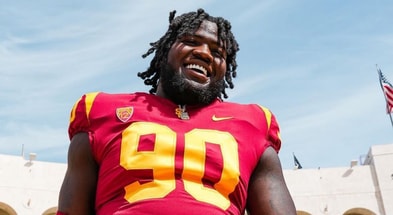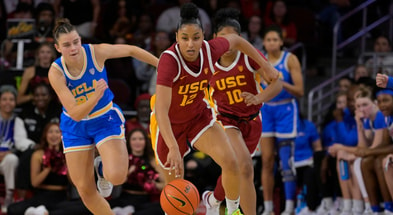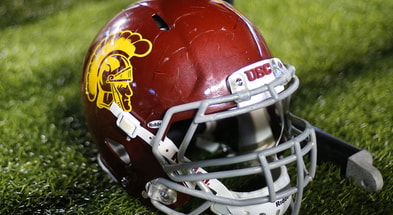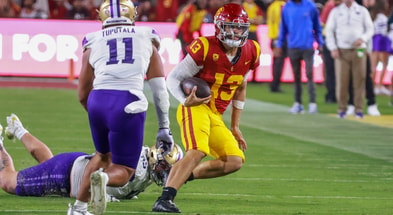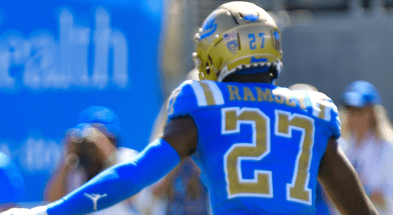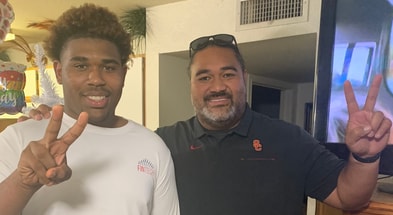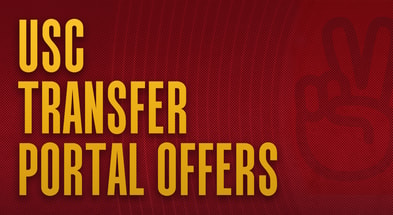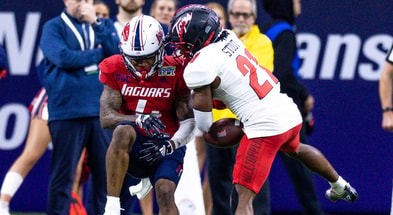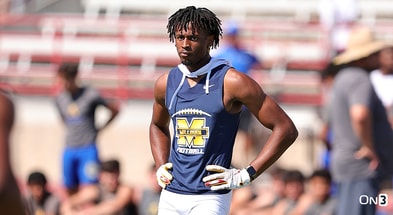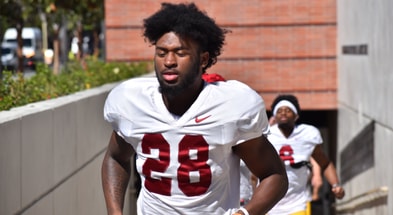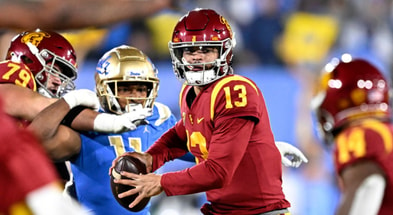Dr. Magdi El-Shahawy is USC’s senior associate athletic director in charge of Student-Athlete Academic Services, and is also an administrator for multiple sports on campus. Dr. El-Shahawy sat down with WeAreSC to talk about some of the networking events his department puts together for USC student-athletes, the progress on the academic side of the department and a special moment earlier this summer for the women’s track and field team.
Tonight is the fourth year of a networking event that your department puts together for the football team (this interview was conducted last Wednesday), talk about how the event has evolved and what takes place.
“Our mission here is to take the four years that our players are here and prepare them for the next 44 years of their lives and beyond. We talk Trojan Family all the time and one of the benefits of going to an institution like USC is the network and the pride we take in taking care of our own. I think it’s important from the moment they come on campus that they get exposed to the wide variety of individuals who can help mentor them, provide advice, answer questions about different career paths, serve as contacts for internships or post-graduate jobs. It’s something we started four years ago with an idea to help these young men look beyond their playing days. As a former player myself (DL at Florida State) I know how a player can be focused on the next step of the NFL and not really seeing your life beyond football. The reality is that the NFL isn’t really a career for most guys, a career is something you can do into your 60’s and 70’s. Most guys in the NFL don’t play into their 30’s, so we call it a well-paid temporary job. A career is what you’re going to be spending the rest of your life doing.”
“To get them thinking along those lines we have to spend a lot of time talking to them about it. The first year we had about 30 industry professionals, some of them former USC student-athletes, guys like Thomas Williams, who played 5 years in the NFL and always said he never thought his last play would be his last play. It was a neck injury that forced him out and he wasn’t prepared for that. He has an exceptional gift for teaching, sharing and helping people. He’s a really gifted speaker, has passion, and so connecting him with our student-athletes is something we do all the time. At this networking dinner we’ll have people from commercial real estate, government jobs, sales, public relations, fitness jobs, sports broadcasting, it really runs the gamut. We take the guys on the team based upon their identified career choices based on an Athlete Career Transition form that we have them fill out at the start of each year so that we know what they are interested in, and then we assign them seats at tables with people who resemble their interests. We’ll have 50 industry professionals tonight with 100 players so each table will have 3 professionals and 6 players. What I really love about this event is how it has a life of its own. We start off with some informal talk before dinner, then we eat and have a couple people speak, and the event is technically over yet it seems like that’s when it starts. We list the event as going from 6:30-8:00 but you’ll see people staying and talking until 9:30-10:00. It’s been so successful that last year we expanded it to every sport in our department. A big key has been the buy-in of our student-athletes, they see this as an environment where they get to mingle, to kick back and talk over a meal, to see how many people are giving of their time to help them, it’s a wonderful thing.”
What are the next steps for programs like this?
“What we’re looking at doing is facilitating sort of organized internship opportunities and, if you will, create corporate partners with people who see what we are doing and want to give our athletes a crack at an internship. Yesterday we took a group of our football players to an e-sports event, one of the biggest industries in the world, and we’ve got two USC alums running one of the biggest companies in the industry right here in LA. We went to their campus and I was blown away. Sometimes you think you have to be a tech person or an engineer but they have 3,000 people working for them with people in marketing, art, public relations, security. We want to do more things like that where the players get to experience seeing how a company works. Last spring break we sent a group of players to New York to visit the Bank of America Merrill Lynch offices for job shadowing opportunities and learn about the financial services industry in the financial capitol of the world. We have an organized plan about expanding these efforts and helping create more job prospects.”
Let’s talk about the academic side of your job because I know the department had a very good spring in that regard.
“Yes we did. Our NCAA Academic Progress Rate (APR) was our best ever. It’s the 5th year in a row that we set an all-time high. Our graduation success rate for student-athletes at 86% is the 9th time in 10 years that we set an all-time high, and in two years we’ll be at 90% success rate for graduation as a department. That’s ultimately what we’re trying to do is graduate all our student-athletes but something else I’m really proud of is seeing the academic stats going up. When I first arrived here in 2000 the average GPA was in the 2.7 range, and two years ago we hit a high of a 3.0 average, and we hit a 3.0 again this past spring. We’ve also seen a dramatic reduction of student-athletes who are at-risk of being on probation. In 2000 we were in the mid-40’s heading into the fall semester in terms of the number of student-athletes on probation. It didn’t change overnight but over the last five years we’ve been in the single digits. Last year, out of 600 student-athletes, we had 7 on probation. Now, I’d love to see it at zero but I’m proud of where we’re at and it’s a reflection of the culture and the work being put in not only by the student-athletes but the coaches, counselors and leaders of our academic services staff such as Dr. Denise Qwok, Heather Bell and Mimi Butler. There is so much synergy that goes on with our staff and the coaches to provide a sound plan and to hold the student-athletes accountable. We track things throughout the week, the month, the term, to make sure we don’t have any surprises. If we see that someone is falling behind we take a look at what we can do in order to hit the benchmark that is needed, do we need to double up support, hold you out of some practices. It’s not just about staying eligible, it’s about maintaining progress toward the degree. You’ll hear our coaches talk a lot about how many seniors already have their degrees because if you’re here and going to summer school you should have your degree in 3 to 3 ½ years. We had 15 football players last fall who already had their degrees and were able to wear that graduate patch as a badge of honor.”
I think one of the biggest things to like about those numbers is the fact that the student-athletes have to compete against the overall student body while maintaining the time commitment of their sport.
“It’s a very demanding academic institution and we tell our prospective student-athletes that if they aren’t ready to work hard then they should go somewhere else. If you come here we will provide you with the best support, we’re not going to do the work for you, we’re not going to enable you but we will teach you how to be self-reliant. It may take a while to get where we want you to be but we’re going to continue to teach you, assess your strengths and weaknesses, and coach you up in the academic arena to perform. It warms my heart when I see a student that buys in, that trusts we have their best interest at heart and they see that it can become a positive experience, that they gain confidence and can see their growth.”
So where do you go from here on the academic side?
“We’ve talked about implementing more technology to help us do the job we do, like using certain databases to help us monitor academic progress and projections, tutorial scheduling, using more technology in teaching student-athletes. Maybe there are some who are strong visual processors but need help with auditory learning or note taking skills. That is becoming more and more a part of our routine in areas of reporting and communication, because communication is such an important part of what we do. In the last couple years we’ve done some academic skill building with some of our at-risk students and a full-time learning specialist, and those results have been transformative.”
You are also the sport administrator for Track & Field and we had a moment this year with women’s track that captured something special. Tell us about what you saw that day.
“It’s unbelievable in terms of the circumstances that it came down to the final race we had to win the 1,600 relay in order to win the national championship. And if you were at the meet, there were a lot of things that had to happen just to be in that position. The University of Georgia and Stanford were clearly in the lead and had more opportunities for points that could have sealed the deal before we even got to the relay. I remember the Stanford discus thrower was in first place with only two events after that, and on the last throw she got passed by two people, which cost them four points (we ended up beating them by two points) and Georgia had the defending national champion long jumper and a high jumper that was expected to do well, one of them didn’t place and the other got 7th place, which gave us a chance to win it at the end. Once the relay starts we’re in 3rd place, 4th place the whole time and we get to the point of passing the baton for the final leg, so in my mind we’ve got Kendall Ellis and we see Deanna Hill closing, and in my mind I’m thinking “she’s going to take it and she’s going to win” because we’re only a few steps off first. But then they bobble the exchange, we fall significantly behind, and now in my head I’m thinking “wow, it’s not gonna happen”. Not only was the Purdue runner ahead of us but so was the Oregon runner, she had to pass two people that had a good 10-20 meters on her in the final 200 meters. To see that closing, the way it happened, watching it live you didn’t know if she caught her or not, so there was a pause to wait for the scoreboard to show if she won or not. When they showed USC it was just a feeling of elation, it was great, it was one of those moments that will go down in Trojan lore like the Anthony Davis 1974 Notre Dame game or the Bush Push. We will talk about that race, that national championship, for years to come.”
I think it’s safe to say that moment was a definition of Fight On. To hear the TV announcer at the beginning of the final stretch saying “oh, it’s over unless they drop the baton”.
“No question. It’s almost comedy when you watch it. In my mind it should have won an ESPY. If you know track, what she did, that 50.01 split, is phenomenal.”
I have to imagine that moment is one of the reasons you work in college athletics.
“It’s a byproduct of being in this profession. If you love sports it’s the beauty of being able to experience moments like that. Certainly that’s not why I’m in this profession, I’m in this profession to help young men and women succeed and prepare them for life, but to also have the opportunity to be a part of a moment like that is truly something special.”
At USC these days with the way track scholarships are allotted we aren’t really supposed to be winning national championships.
“A lot of people don’t understand that as a private institution in an equivalency sport it’s very difficult to build depth. Our coach, Caryl Smith-Gilbert, does a great job of identifying talent, recruiting them and developing them. She’s created a culture where the GPA’s are among the best in the department, two of the top 5 GPA’s in the whole department are All-American’s on the women’s track team in freshman Twanisha Terry and Anna Cockrell, who is a perfect 4.0 student. Michael Norman was an honors student. The team GPA’s for both men and women is above a 3.0. They are very active in community service. She runs a tight ship when it comes to compliance. I’m proud to say they do things the right way. Winning is one thing but to do it with class and integrity in every phase, it’s really what we’re all in this business for.”
Garry Paskwietz (1966-2019)
Garry Paskwietz was a pioneer in bringing team-specific sports coverage to the internet. He founded WeAreSC in 1998 and was an Emmy winner for his work with Fox Sports West. Always generous with his time, knowledge, and compassion, he touched the lives of countless USC and high school football fans.
